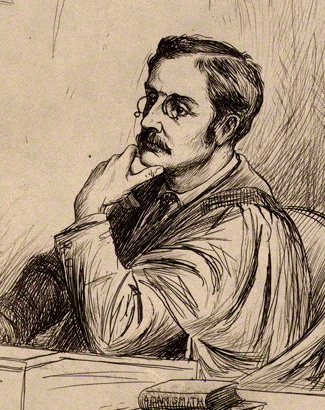| Profile | Major Works | Resources |
John Shield Nicholson, 1850-1927.

Classical economist at Edinburgh, a one-time student, later a critic, of Alfred Marshall.
Born in Wrawby, Lincolnshire, the son of a Independent minister originating from Cumberland. John Shield Nicholson obtained his B.A. in philosophy from King's College, London in 1870, and went on to study for a year at the University of Edinburgh. He subsequently enrolled at Trinity College, Cambridge, to study moral sciences. At Cambridge, Nicholson came under the tutelage of Henry Sidgwick and Alfred Marshall (then a lecturer at St. John's), who introduced him to economics.
Nicholson was an early prize pupil of Marshall. In 1877, Nicholson won the Cobden prize, with an essay that would become his first publication, the Effect of Machinery of Wages. He completed his M.A. at London in 1878, winning the Gersternberg prize. Nicholson eked out a living as a tutor until his appointment in 1880, at the relatively young age of thirty, as Professor of Political Economy at the University of Edinburgh (more precisely, "Professor of Commercial and Political Economy and Mercantile Law"). He would remain at Edinburgh until his retirement in 1925.
In 1893, Nicholson published the first volume of his Principles, intended as a textbook for economics for the lay public. It jostled for attention with Marshall's own recently published textbook. Unimpressed by Neoclassicism, Nicholson sought to restate the old Classical truths in practical, appealing form. Nicholson's attack on utility theory and Marshall's consumer surplus prompted a brief controversy with F.Y. Edgeworth in the 1894 edition of the Economic Journal. While severely critical of the Neoclassicals, Nicholson was no less repelled by the English Historical School.
Nicholson's great strength was his ability to communicate economic questions to the general public. Nicholson did his best to explain all sides of current economic debates -- from the impact of mechanization to the fallacies of Marxism. Like his great hero, Adam Smith, Nicholson nurtured a cautious liberal position, but he was not a doctrinaire laissez-faire apologist. A believer in the virtues of competition, Nicholson was a virulent opponent of both trade unions and corporate trusts and was highly disturbed by the appeal of simple-minded socialism. However, at the same time, Nicholson was a believer in government regulation and anti-trust law, a bimetallist and a proponent of the underconsumption thesis of economic fluctuations.
John Shield Nicholson also had time to publish three novels in 1888-1890.
Nicholson was the first president of the Scottish Society of Economists (f.1897, since renamed Scottish Economic Society).
|
Major Works of John Shield Nicholson
|
|
HET
|
|
Resources on John S. Nicholson
|
All rights reserved, Gonšalo L. Fonseca
